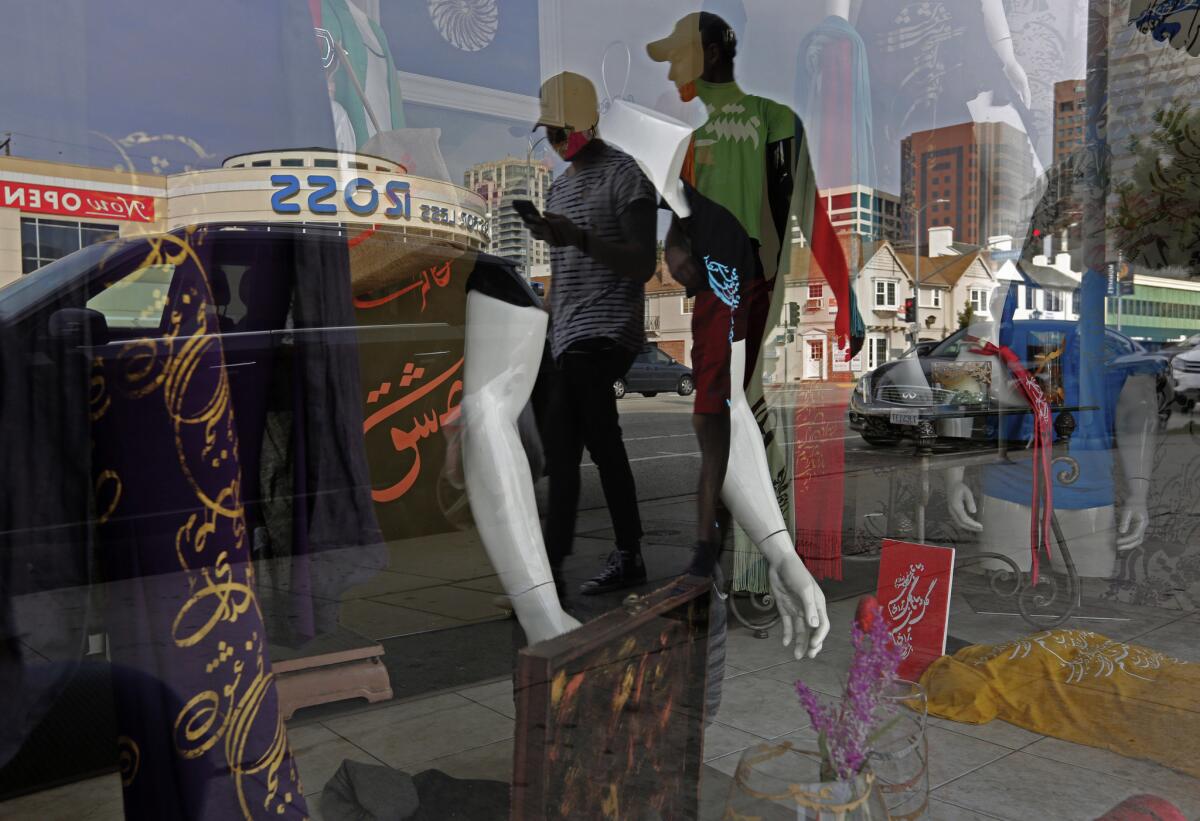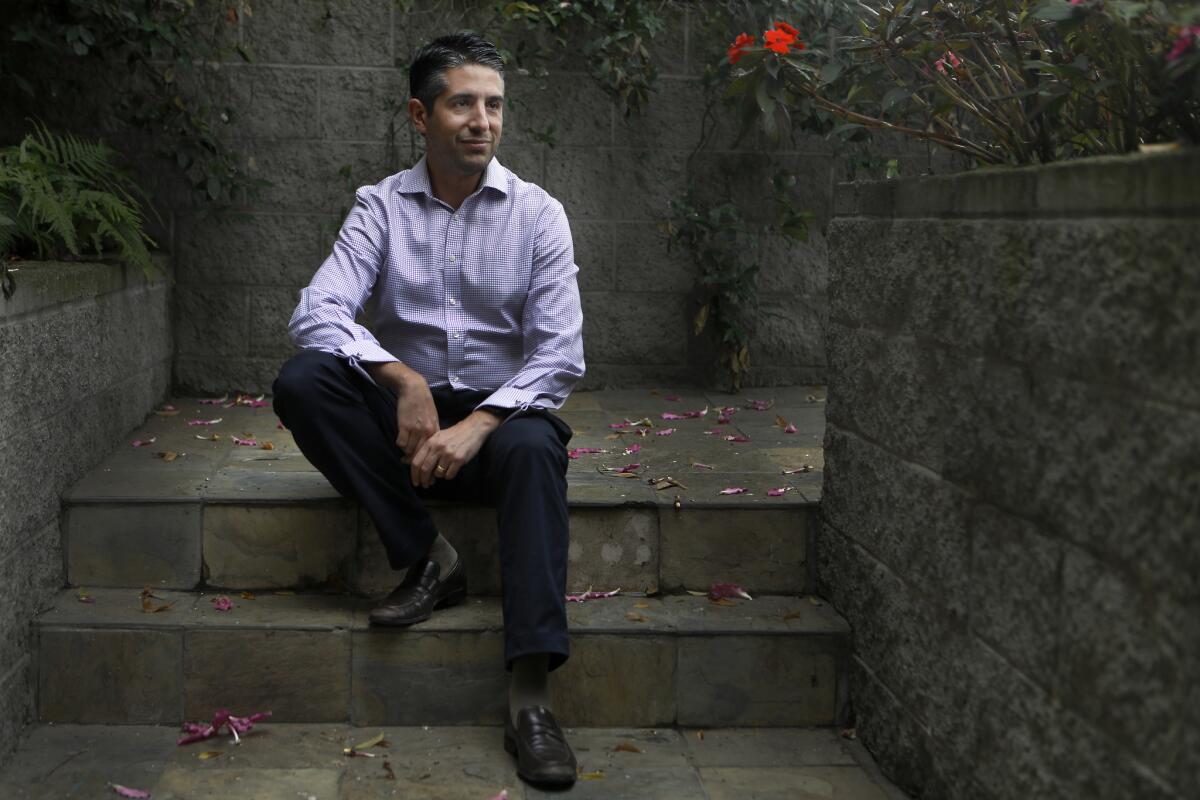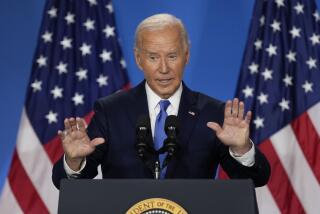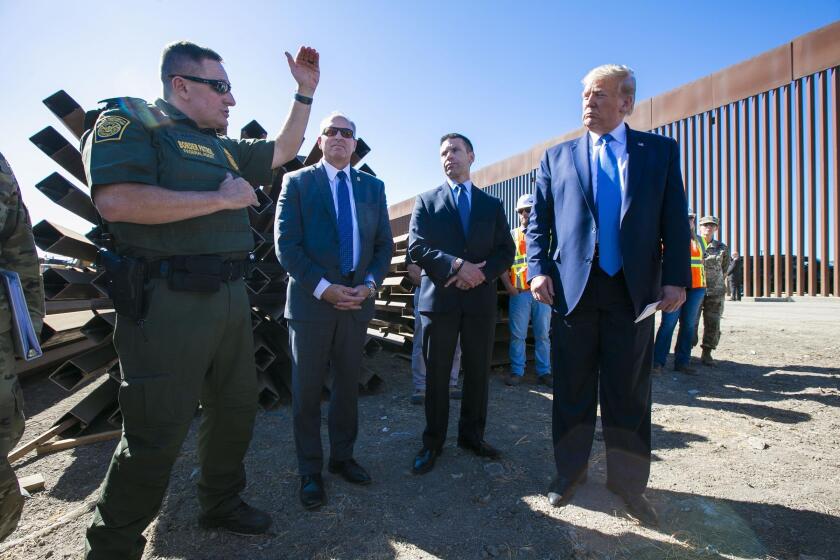What do Iranian Americans expect from a Biden administration? There’s no one-size-fits-all answer

Joe Biden wasn’t Hanieh Jodat Barnes’ first choice.
An immigrant from Iran who served as a California delegate for Sen. Bernie Sanders earlier this year, she threw her support behind Biden only once he was named the Democratic presidential nominee. She wanted to do whatever she could to ensure that President Trump would not be in office for another four years, she said, while also organizing to push Biden’s platform further left.
So Barnes joined voter mobilization efforts and co-founded the initiative Immigrants for Biden, working on a 50-state mobilization campaign.
“What was at stake was greater than ego,” said Barnes, a progressive Democrat who is in her 30s. “Another four years of Trump would have been horrendous, especially for people of color.”
In California, as in other parts of the nation, Iranian Americans for decades have been caught in the middle of a geopolitical ping-pong match, watching as U.S. policy toward Iran shifts from diplomacy under one administration to a more hardline approach in the next.
Since 2016, they have seen the United States leave the landmark multilateral nuclear accord with Iran and witnessed the Trump administration’s targeted killing of Iranian Gen. Qassem Suleimani last January, bringing the two countries near the brink of war.

They also have watched as additional economic sanctions leveled by Trump have further undermined Iran’s economy. As his term winds down, Trump is moving to impose even more economic restrictions on the regime amid a “maximum pressure” campaign aimed at forcing Iran to come to a better nuclear deal — despite critics’ charges that such policies have hurt ordinary Iranians far more than their leaders.
As many as a half-million Iranian Americans live in Southern California, according to community estimates. As they look to the incoming Biden administration to grapple with issues that are top of mind for many in the diaspora — the economy, jobs, foreign policy and the coronavirus pandemic — community members say it would be a mistake to assume that there is a one-size-fits-all approach to pleasing a portion of the electorate that is so politically diverse.
Among Democrats, some, like Barnes, identify as progressives, while others see themselves as moderates who respect Biden’s more centrist politics.
The southern half of the state — centered on enclaves of Orange County, Los Angeles and San Diego — is home to a conservative Iranian contingent that tends to back Trump, his withdrawal from the Iran nuclear deal and his tough talk against the Islamic Republic. Indeed, some Iranian Trump voters continue to support his unfounded claims that he won the election, echoing some of the president’s backers across the nation.
For Barnes, domestic and foreign policy are entwined. The money “set aside to invest in war,” she said, could be redirected toward Americans who have lost work-based health insurance who are underinsured amid a pandemic, or toward reinforcing the social safety net.
“We still have students up to their eyeballs in student debt that they can’t afford to pay,” she said. “The Biden administration has to look really carefully at that. If we ignore the people living below the poverty line, then we will have another Trump who is talking to people below the poverty line.”
Equally important to Barnes is the Biden administration’s promise on the first day of his presidency to rescind the U.S. travel ban on several Muslim-majority nations. Her hopes of having her mother visit California dissipated when the Trump administration passed the ban in 2017.
She saw her mother for the first time in more than 19 years in a Dubai hotel lobby in 2018, where she’d flown from Iran en route to a visa interview in Abu Dhabi. But her application was rejected because of the ban.
“I’ve spent all of my life here fighting for the rights of women,” Barnes said through tears. “I just couldn’t protect my own mom.”
A public opinion survey conducted by the Public Affairs Alliance of Iranian Americans in September found that the most important issues Iranian Americans considered before voting were the economy, jobs and foreign policy, followed by healthcare, terrorism and national security, and education. Respondents preferred Biden to Trump by a margin of 56% to 31%, with Iranian American independent voters preferring Biden 57% to 17% for Trump.
The survey also found increased support for Trump’s handling of U.S.-Iran relations since he took office. Some 31% backed Trump’s moves in 2020, an uptick from 22% in 2019 and 2018.
“Whenever we try to describe any single perspective of Iranians in America, we’re always going to come up short because we’re a diverse community,” said Amy Malek, an anthropologist and researcher at Princeton University studying the Iranian diaspora. “Much like rest of the country, our Iranian communities across the U.S. are also divided in our sense of what we want to happen both in the U.S. and in Iran.”
In West Hollywood, councilwoman-elect Sepi Shyne stressed that the Iranian American population includes “everyone from far-left progressives all the way through the spectrum to far-right conservatives.”
“We must remember that, before the Iranian Revolution, Iran had a lot of diversity and was actually a melting pot like the United States, but just different because of where we were situated geographically,” she said. “That diversity has now translated to a diversity of political beliefs.”

When it comes to domestic priorities, the economy takes center stage for Houman Hemmati, an ophthalmologist and biotech executive in Los Angeles.
“A lot of Iranian Americans are business owners or employers, and have a strong interest in maintaining a pro-business environment, which consists of both a lack of excessive regulation and tax policy that encourages entrepreneurship,” he said.
Those who do support Trump’s policies shouldn’t be discounted, he added.
“A lot of Iranian Americans are excited about a couple of developments that occurred under this current administration,” Hemmati, 44, said. “The strengthening of the rhetoric against Iran, the lack of financial cooperation and leaving a deal that was viewed as imperfect. And, of course, a very critical and not just symbolic but also forceful act in taking out Qassem Suleimani.”
Hemmati would like to see the Biden administration follow in those footsteps, though he believes that the president-elect will “likely give in to pressure from within as well as from European countries to return to the [nuclear] deal.”
Many Iranians also are sensitive to the current discussions on race relations and law enforcement. But some also worry about cutting back on policing.
“We’re a group of people who care a lot of about maintaining social order because we left a country that was in the midst of chaos,” he said, “and many of us have a fear of descending again into chaos in a country we sought refuge in.”
Sam Yebri, president of the Iranian American Jewish civic organization 30 Years After, said he is excited to see Biden assemble his team of experts tasked with developing plans to recover from the pandemic. On the local level, he would also like the incoming administration to help cities combat homelessness.
“We need a robust federal partner on those issues,” said Yebri, who plans to run for the Los Angeles City Council 5th District seat in 2022.
Internationally, he said he would like a “return to traditional diplomacy and coalitions, and international institutions.”
Yebri doesn’t remember the last time Iranians followed both federal and local politics so closely, he said. Community members in recent years have grown more involved in contacting their elected officials, joining street protests and — most important, he said — voting.
“It’s emblematic of this moment,” he said. “There are families divided. The community certainly feels divided when it came to this election, with people conflating partisan politics with morality. I think we all need to realize this is part of the democratic process: to evaluate policies and politicians.”
More to Read
Sign up for Essential California
The most important California stories and recommendations in your inbox every morning.
You may occasionally receive promotional content from the Los Angeles Times.











